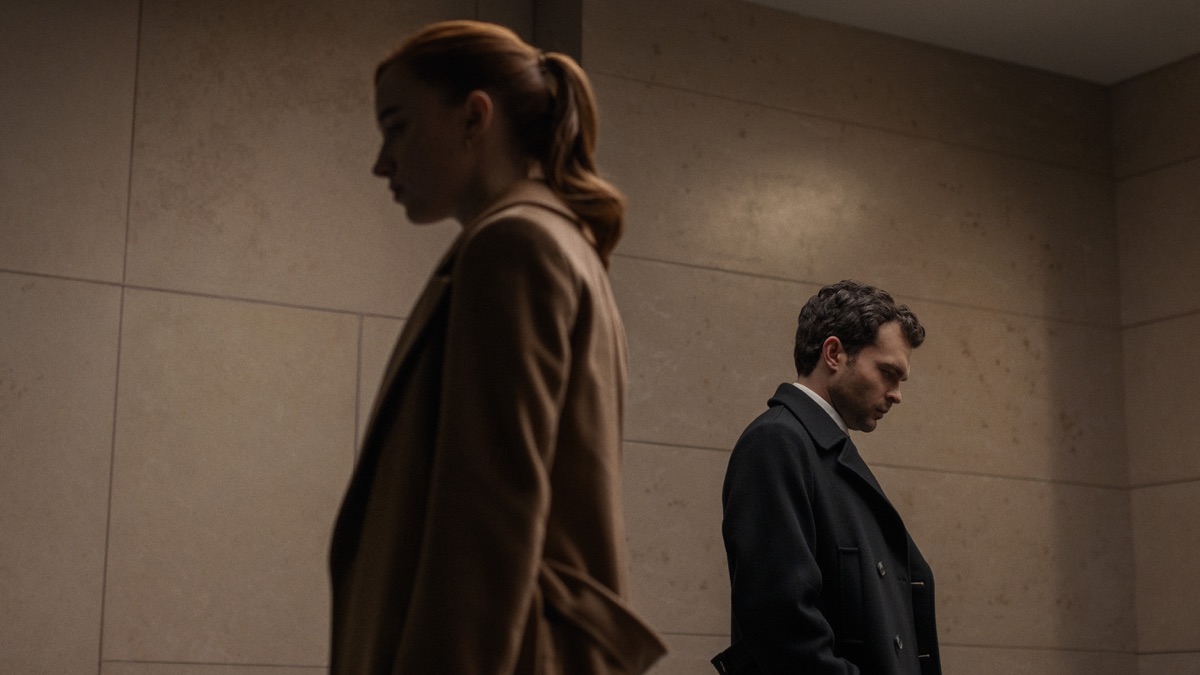FAIR PLAY. Gaslighting: The Movie [REVIEW]

Fair Play made its debut in January at the Sundance Festival, where it became one of this year’s favorites. Various film studios began a heated battle to acquire distribution rights. Eventually, the film featuring Phoebe Dynevor, star of Bridgerton, and Alden Ehrenreich, best known for roles in Solo: A Star Wars Story and Hail, Caesar!, landed on Netflix for a significant $20 million. I’m evaluating the highly anticipated film that has just been released on the platform.
Gaslighting—an English term meaning “psychological violence involving manipulating another person in a way that the victim gradually loses trust in their judgments, becomes disoriented, frightened, and loses confidence in their memory or perception.” This definition aptly captures the main theme, plot, and the behavior of the protagonist Chloe Domont, while also shedding light on what the main character must endure.
As we get to know Emily and Luke, they are having a great time together at a wedding. So much so that, after a passionate encounter resulting from mutual attraction (as seen in the opening scene), the man proposes to the woman in a moment of impulse, and she gladly says “yes.” However, in the next scene, it turns out that the newly engaged couple cannot share the happy news with the world because they have been in a relationship for two years, working at the same company, and keeping it a secret from their bosses and the HR department. At the office, they pretend to be just colleagues.

When the girl hears a rumor that her boyfriend might become the new manager, she immediately shares the good news with him. However, when it turns out that the rumor is unfounded and she, not he, gets the promotion, the real action of the film begins, and the slippery slope on which our characters will slide unfolds.
The primary theme of Fair Play becomes Luke’s reaction to his partner’s promotion and how both of them deal with his wounded ego. It starts with seemingly innocent jokes that are, in fact, well-aimed jabs, revealing the man’s thoughts on the situation. It then progresses to further transgressions, not only against the rules governing their relationship but also against the norms of good behavior and even the law. It’s as if the fact that the woman became his superior upset the equal balance of their private relationship. When they were on the same level, everything was fine. Only when she begins to succeed, “which was supposed to be his,” things spiral out of control because the man cannot soothe his intrusive thoughts about his own worth.
Another important theme is how the woman navigates her success in a male-dominated company. Her promotion is not only commented on by her partner, whose emotional reactions intensify over the course of the film, but also by other colleagues and management. Every action of hers is widely commented on, and when she makes a mistake, her boss unabashedly insults her as “f**king dimwit,” as his management style is associated with terrorizing employees.

The girl has to learn how to adapt to new conditions while remaining true to herself. The whole issue is accurately commented on in a small scene played out solely through glances (the director often executes many scenes without words in a remarkably understandable way). When another woman appears in the office at one point, the camera shows the main character’s reaction in a way that it seems as if all the thoughts that her unstable partner had accused her of just the day before are passing through her head. It’s as if misogyny has become such a learned behavior that it becomes the default reaction in the workplace. Although there is no interaction between the women, the way this moment is presented strongly suggests a range of hidden meanings that resonate strongly with the audience.
Fair Play by Chloe Domont is an exceptionally intriguing and bold debut. The director and screenwriter in one person created a film with a dense atmosphere that can captivate and surprise, while also stimulating discussions. Particularly efficient is the direction, where several times things are played out without any words, only through looks and camera work. This is a special achievement because, in many other moments, Domont’s film is quite explicitly literal, with characters uttering lines that directly describe their problems. The fact that the creator managed to combine both forms of communication in one film is a pleasant surprise and allows her debut to be a balanced, coherent story that simply stimulates contemplation and emotional reactions. This makes Fair Play a film definitely worth attention, one that can initiate many important discussions. Worth watching!

